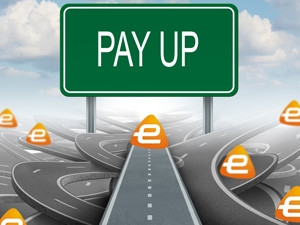
When it comes down to brass tacks, the notion of using South Africans' fuel levies to fund Gauteng's roads will never be fair or viable.
This is according to spokesperson for the SA National Roads Agency (Sanral) Vusi Mona, in response to a statement around the road agency's recent advertising campaign by the Justice Project SA (JPSA).
While the debate around using the fuel levy to fund the Gauteng Freeway Improvement Project (GFIP), instead of introducing e-tolls, has been raging for some time now, JPSA chairman Howard Dembovsky on Sunday criticised Sanral's argument - posed in national newspapers at the weekend - that a fuel levy is not a sustainable solution.
Dembovsky said Sanral and National Treasury should enforce either the fuel levy, or e-tolls - but not both - if they expect South Africans to concede their part in paying for the province's roads.
Referring to Sanral's advert headed "Why not a fuel levy? It's just not sustainable", Dembovsky says: "If, as it would appear they are, Sanral is saying the fuel levy should be scrapped, then that is a completely different kettle of fish and we would be forced to agree with them - given the fact that it has been acutely demonstrated that our fuel levy is not being used for roads infrastructure as it should be."
Fuel levy spend
But Mona has in turn criticised Dembovsky's contention, that the agency is firstly not proposing the scrapping of the fuel levy - and that the claim of misspent levies is "misleading and inaccurate".
Mona says treasury does not have a policy of ring-fencing the fuel levy. "[Dembovsky] can check with treasury the details behind the rationale of this approach which, by the way, has been explained in court documents."
He reiterates the National Treasury is responsible for funding the non-toll portfolio of the road network, which forms 84% of Sanral's business. "Sanral has done a lot of work in the non-toll portfolio in all provinces."
Sanral's non-toll portfolio - to which treasury contributes R10 billion per year - includes road maintenance, construction of pedestrian bridge crossings, widening of highway lanes and resurfacing, says Mona. He adds Sanral has recently undertaken at least eight non-toll projects across SA.
Mona says the fuel levy collected in the last financial year amounted to R42 billion, and is "far less than the money required for roads in SA". For road maintenance alone, he says, SA has a backlog of R149 million.
"What we are saying is that it would not be fair to ask road users in the rest of the country to pay a fuel levy for a benefit that only accrues to Gauteng road users. Our view, which we have stated on many occasions, is that the user pays principle is the fairest way to fund the GFIP."
President Jacob Zuma last week signed the Bill that effectively gives e-tolls the green light ? and now Gauteng motorists are on tenterhooks as transport minister Dipuo Peters finalises e-toll regulations and tariffs. Once finalised and gazetted, a mandatory 14-day period is all that stands between the highways as the province now uses them, and roads comprising 49 taxable through-points.
Share